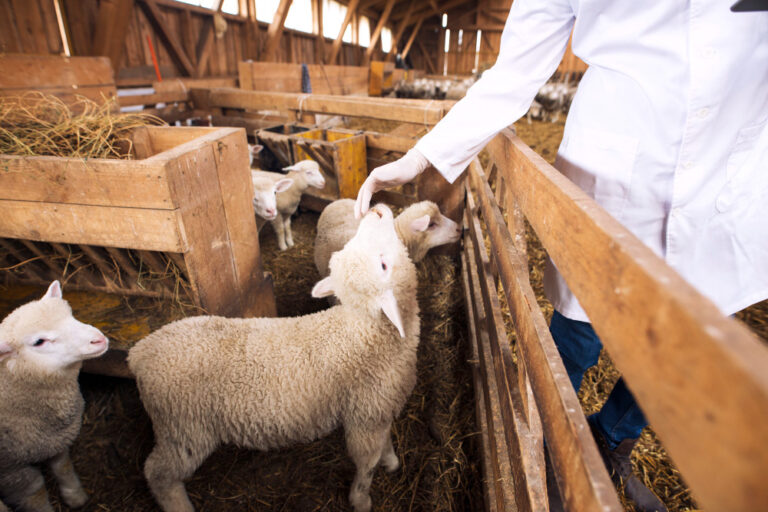Sheep farming is an essential component of agriculture worldwide, providing meat, milk, and wool to meet global demands. However, ensuring the health and productivity of your flock begins with proper nutrition. The best feeds for sheep play a pivotal role in improving overall flock health and increasing yield. Leading sheep feed companies are developing innovative feeding solutions to meet these needs.
In this article, we will explore the importance of high-quality sheep feed, the advancements made by animal feed manufacturers in Saudi Arabia, and why customized feed solutions are vital for flock success.
Understanding the Basics of Sheep Nutrition
Sheep have unique dietary requirements that vary based on their purpose—meat production, wool growth, or reproduction. A well-balanced diet ensures your flock is healthy, productive, and resilient to disease.
Essential Nutritional Components for Sheep
- Protein: Supports growth, muscle development, and milk production.
- Carbohydrates: Provide energy for daily activities and metabolic functions.
- Vitamins and Minerals: Essential for immunity, bone strength, and wool quality.
- Fiber: Aids digestion and prevents gastrointestinal issues.
- Water: Critical for overall hydration and nutrient absorption.
Innovations in Sheep Feed
Customized Feed Formulations
Modern sheep feed companies are creating feed solutions tailored to the specific needs of sheep at various life stages. These feeds include:
- Starter feeds for lambs to promote early growth
- Maintenance feeds for adult sheep to sustain health
- Specialized feeds for pregnant and lactating ewes
For premium-quality options, explore the products offered by Nafa Feeds, a leader in livestock nutrition.
Sustainable Feeding Practices
Leading animal feed manufacturers in Saudi Arabia are emphasizing sustainability by:
- Incorporating locally sourced ingredients
- Reducing feed production waste
- Utilizing energy-efficient processes
These practices align with Saudi Arabia’s Vision 2030 goals, ensuring long-term agricultural sustainability.
Fortification with Probiotics and Enzymes
The inclusion of probiotics and enzymes in sheep feed improves:
- Gut health
- Feed efficiency
- Nutrient absorption
Such advancements make the best feeds for sheep more effective and beneficial.
Comparing Sheep Feed and Camel Feed
While sheep and camels are both vital to Saudi Arabia’s agriculture, their nutritional requirements differ. Here is a comparison of their feed needs:
| Feature | Sheep Feed | Camel Feed |
| Primary Ingredients | Protein-rich grains, vitamins | Fiber-rich grains, hydration aids |
| Nutritional Focus | Growth, reproduction, wool production | Hydration, energy, digestion |
| Climate Adaptation | Adapted for moderate climates | Designed for arid desert environments |
Learn more about camel feed by visiting Nafa Feeds.
Why High-Quality Sheep Feed Matters
Investing in premium sheep feed ensures:
- Improved Growth Rates: Nutrient-rich feeds accelerate growth and increase meat yield.
- Enhanced Reproductive Performance: Proper nutrition boosts fertility and lambing success.
- Disease Resistance: Balanced diets strengthen the immune system, reducing veterinary costs.
- Cost Efficiency: High-quality feeds minimize waste and optimize feed-to-output ratios.
The Role of Animal Feed Companies in Saudi Arabia
Saudi Arabia’s agricultural sector has witnessed significant advancements, thanks to the contributions of animal feed companies in Saudi Arabia. These companies are revolutionizing livestock nutrition by:
- Developing innovative feed products
- Addressing species-specific dietary needs
- Promoting sustainable agriculture practices
For trusted feed solutions, explore the offerings at Nafa Feeds.
Best Practices for Feeding Sheep
To maximize the benefits of high-quality sheep feed, follow these best practices:
- Understand Nutritional Needs: Tailor feed based on age, weight, and production goals.
- Provide Clean Water: Ensure constant access to fresh water.
- Adhere to Feeding Guidelines: Follow manufacturer recommendations for optimal feed quantities.
- Monitor Health: Regularly assess your flock for signs of malnutrition or health issues.
- Store Feed Properly: Keep feed in a dry, cool place to maintain its quality.
FAQs About Sheep Nutrition
1. What makes the best feeds for sheep?
High-quality sheep feed includes a balance of protein, carbohydrates, vitamins, minerals, and fiber. It is tailored to meet the specific needs of sheep at different life stages.
2. Can sheep and camels share the same feed?
While some ingredients may overlap, it is crucial to use species-specific feeds to address the distinct dietary requirements of sheep and camels. For example, camel feed focuses on hydration and digestion, while sheep feed emphasizes growth and wool production.
3. Where can I find reliable sheep feed companies?
For premium sheep feed solutions, visit Nafa Feeds.
4. How can I ensure my sheep receive the best nutrition?
Provide a balanced diet, access to clean water, and high-quality feed from reputable animal feed manufacturers in Saudi Arabia.
Future Trends in Sheep Feed
The sheep feed industry is evolving with trends such as:
- Precision Feeding: Using technology to customize feeding programs
- Sustainable Ingredients: Incorporating algae, insects, and other novel protein sources
- Digital Monitoring: Leveraging IoT devices to track feed consumption and animal health
These advancements promise to make sheep farming more efficient, sustainable, and profitable.
Conclusion
Proper sheep nutrition is the cornerstone of a healthy and productive flock. By choosing high-quality products from leading sheep feed companies, farmers can ensure optimal growth, reproduction, and wool production. To explore innovative feed solutions, visit Nafa Feeds, a trusted name among animal feed manufacturers in Saudi Arabia.

